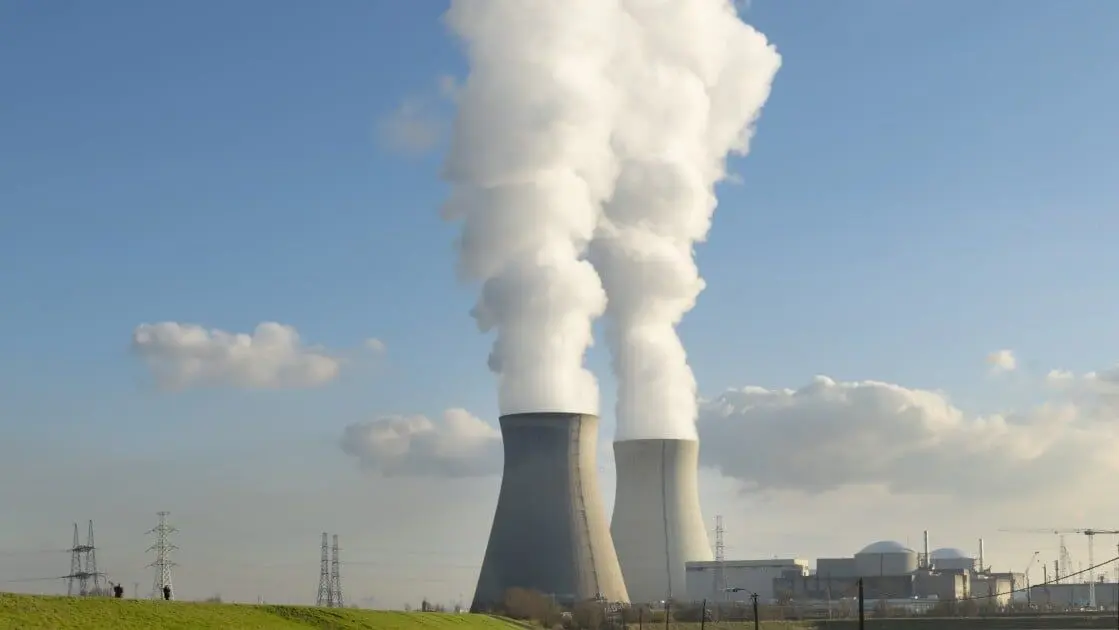Google and Westinghouse Partner to Revolutionize Nuclear Reactor Construction with AI
3 Sources
3 Sources
[1]
Google Backs 10 New Nuclear Reactors For AI, Built by AI. What Could Go Wrong?
Nuclear power plant in Belgium (Credit: Westend61 / Westend61 via Getty Images) President Trump today announced $92 billion in AI-related investments, one of which is 10 new nuclear reactors to be built by Westinghouse in partnership with Google. Construction will begin by 2030, interim CEO Dan Sumner told Trump today at a conference at Carnegie Mellon University, CNBC reports. But given the company's history, that's easier said than done. The US has built just three reactors in the past 30 years, according to the US Energy Information Administration (EIA). The first is a 2016 project in Tennessee. Two followed, both at the same site in Georgia -- one in 2023 and one in 2024. (The latter is not shown on the graph below, which contains data up to 2023.) Both Georgia reactors are the same Westinghouse model the company plans to build again for its next set of 10, called the AP100. But that project came in $18 billion over budget and seven years behind schedule. The federal government under President Obama issued an $8.33 billion loan to help guarantee its completion, but Westinghouse still filed for bankruptcy in 2017 in large part due to its troubles in Georgia, Reuters reports. What's different this time? Westinghouse is throwing AI at the problem. It's partnering with Google Cloud AI streamline production, making it "an efficient, repeatable process." "By partnering with Google Cloud...we can accelerate the deployment of new AP1000 units while implementing powerful AI technologies that will optimize the construction and operations of nuclear power plants," says Sumner. The CEO says the nuclear industry is "reinvigorated" after Trump issued four executive orders to promote the industry in May. It remains to be seen if Google's AI can save Westinghouse's nuclear reactor business, but the company says it's already "successfully achieved a first-of-its-kind proof of concept" using Google Cloud tech. It's using three Google services: Vertex AI (a machine learning platform), Gemini (Google's flagship large language model), and BigQuery (a cloud-based data warehouse). Together, they are able to "autonomously generate and optimize AP100" construction plans, Westinghouse says. But using AI to construct nuclear reactors might be a recipe for disaster. Hallucinations remain a stubborn issue with large language models, so Westingouse will need to double (triple?) check every output. Any issues with these projects could tank the industry, which has fallen out of favor after the disasters at Chernobyl (1986), Three Mile Island (1979), and Fukushima (2011). Could AI make things worse, or create a black box in which even Westinghouse isn't quite sure how the reactor was built? The tech industry is willing to take the risk in its desperate quest for more energy to power its AI data centers. Microsoft is reviving the Three Mile Island plant to power its AI ambitions. Meta CEO Mark Zuckerberg this week announced plans to create several data centers to achieve "superintelligence." Nuclear power could be an attractive, environmentally friendly option -- if it works.
[2]
Google, Westinghouse team up to use AI to build nuclear
Westinghouse taps Big G's cloud smarts to speed up atomic plant builds and keep the grid humming While AI systems are known to spew wrong information and make up facts, Google and Westinghouse Electric are now pressing generative AI models into service to transform how nuclear reactors are constructed and optimize their operation. The two companies aim to pair Westinghouse's "nuclear-specific" HiVE GenAI system and its "nuclear-aware" large language model (LLM), bertha, with Google Cloud's technology and expertise to streamline construction of new nuclear plants and improve the performance of current reactors through "data-driven AI insights." The electric gear maker claims its nuclear AI technology is trained on "75 years of proprietary data, knowledge, and expertise," according to the deal announcement. Westinghouse interim CEO Dan Sumner claimed the AP1000 pressurized water reactor design is the only fully licensed, construction-ready modular reactor available today, and therefore represents the best way to add extra atomic energy sources to the US grid. Ironically, the urgent need to add extra generating capacity to the grid is because of the ever-increasing number of datacenters that are popping up in the US to develop and train ever more sophisticated AI models. A recent Deloitte Insights report estimated that the energy required by AI datacenters in America may be more than 30 times greater in a decade. According to Westinghouse, there are currently six AP1000 units in full commercial operation - two in the US and four in China - plus three planned in Poland, two in Bulgaria, and nine in Ukraine. The company says the reactor design has passive safety systems that will cause it to shut down in the event of a malfunction. The pair claimed they have already achieved a proof-of-concept of the technology, getting it to generate and optimize AP1000 modular construction work packages. This involved the Westinghouse WNEXUS digital plant design platform combined with HiVE AI and Google Cloud technologies, said to include Vertex AI, Gemini, and BigQuery. Westinghouse said that HiVE and bertha will be used to optimize new deployments of the AP1000 reactor, as well as the smaller AP300 small modular reactors, and the even tinier eVinci microreactors. The company believes its AI solutions are also ready to support power plant operations. The eVinci is a reactor design currently under development, with funding from the US Department of Energy, expected to generate 5 MW of power for eight years. Let's hope that Google and Westinghouse don't find that their AI solutions need constant checking by humans to make sure they don't mess up, and that they don't get things wrong about 70 percent of the time. ®
[3]
Google and Westinghouse use AI to automate nuclear construction
"By partnering with Google Cloud to enhance our HiVE and bertha technology, and backed by 75 years of our proprietary nuclear data, we can accelerate the deployment of new AP1000 units while implementing powerful AI technologies that will optimize the construction and operations of nuclear power plants." The two companies have already completed a successful proof of concept using Westinghouse's WNEXUS digital plant design platform alongside HiVE AI and Google Cloud's tools. This proof of concept demonstrated the autonomous generation and optimization of construction work packages specifically for AP1000 modular reactors, an effort aimed at turning what is typically a complex, labor-intensive process into a streamlined, repeatable workflow. "This partnership with Westinghouse combines Google Cloud's AI technologies and expertise with Westinghouse's century-long expertise in nuclear innovation to chart a new path towards a smarter and safer future," said Kyle Jessen, Managing Director, Commercial Industries, Google Cloud.
Share
Share
Copy Link
Google Cloud and Westinghouse Electric announce a partnership to use AI in streamlining nuclear reactor construction and operation, raising both excitement and concerns in the industry.

Google and Westinghouse Join Forces for AI-Powered Nuclear Innovation
In a groundbreaking partnership, Google Cloud and Westinghouse Electric have announced their collaboration to revolutionize the construction and operation of nuclear reactors using artificial intelligence (AI) technologies
1
2
. This initiative aims to address the growing energy demands of the AI industry while potentially transforming the nuclear power sector.The Partnership and Its Goals
Westinghouse, a leader in nuclear technology, is teaming up with Google Cloud to enhance its nuclear-specific AI systems, HiVE GenAI and bertha, by integrating them with Google's cloud expertise
2
. The partnership's primary objectives include:- Streamlining the construction of new nuclear plants
- Optimizing the performance of existing reactors
- Accelerating the deployment of Westinghouse's AP1000 reactor units
Dan Sumner, Westinghouse's interim CEO, emphasized the potential of this collaboration, stating, "By partnering with Google Cloud... we can accelerate the deployment of new AP1000 units while implementing powerful AI technologies that will optimize the construction and operations of nuclear power plants"
3
.Proof of Concept and Technology Integration
The companies have already achieved a successful proof of concept, demonstrating the autonomous generation and optimization of construction work packages for AP1000 modular reactors
3
. This breakthrough combines:- Westinghouse's WNEXUS digital plant design platform
- HiVE AI system
- Google Cloud technologies, including Vertex AI, Gemini, and BigQuery
Kyle Jessen, Managing Director of Commercial Industries at Google Cloud, highlighted the significance of this partnership, stating, "This partnership... combines Google Cloud's AI technologies and expertise with Westinghouse's century-long expertise in nuclear innovation to chart a new path towards a smarter and safer future"
3
.Addressing Energy Demands and Industry Challenges
The urgency for additional generating capacity is driven by the rapid growth of AI-focused data centers. A Deloitte Insights report estimates that energy requirements for AI data centers in the US could increase by more than 30 times within a decade
2
. This partnership aims to address these energy needs while also tackling longstanding challenges in the nuclear industry, such as:- Cost overruns and delays in reactor construction
- Safety concerns following historical nuclear disasters
- The need for environmentally friendly power sources
Related Stories
Potential Risks and Concerns
While the partnership promises significant advancements, it also raises important questions about the application of AI in such a critical and sensitive industry:
- AI Reliability: Concerns about AI hallucinations and errors persist, necessitating rigorous verification processes
1
. - Safety Implications: The use of AI in nuclear reactor construction and operation could potentially introduce new risks or create a "black box" scenario where decision-making processes become less transparent
1
. - Industry Perception: Any issues arising from AI-assisted nuclear projects could further damage public trust in nuclear energy, which has already been affected by past disasters
1
.
Future Prospects and Industry Impact
Despite the challenges, the partnership between Google and Westinghouse represents a significant step forward in nuclear technology. The collaboration aims to apply AI solutions to various reactor designs, including:
- AP1000 pressurized water reactors
- AP300 small modular reactors
- eVinci microreactors (currently under development)
2
As the tech industry continues its quest for more energy to power AI data centers, nuclear power enhanced by AI could emerge as an attractive, environmentally friendly option – if implemented successfully and safely
1
.References
Summarized by
Navi
[2]
[3]
Related Stories
Google and Westinghouse Deploy AI to Accelerate Nuclear Reactor Construction
20 Nov 2025•Technology

Google Partners with Elementl Power to Develop Advanced Nuclear Energy Sites Amid Growing AI Power Demands
08 May 2025•Business and Economy

Google Explores Nuclear Power for AI Data Centers: Balancing Energy Demands with Climate Goals
04 Oct 2024•Business and Economy

Recent Highlights
1
ByteDance's Seedance 2.0 AI video generator triggers copyright infringement battle with Hollywood
Policy and Regulation

2
Demis Hassabis predicts AGI in 5-8 years, sees new golden era transforming medicine and science
Technology

3
Nvidia and Meta forge massive chip deal as computing power demands reshape AI infrastructure
Technology





